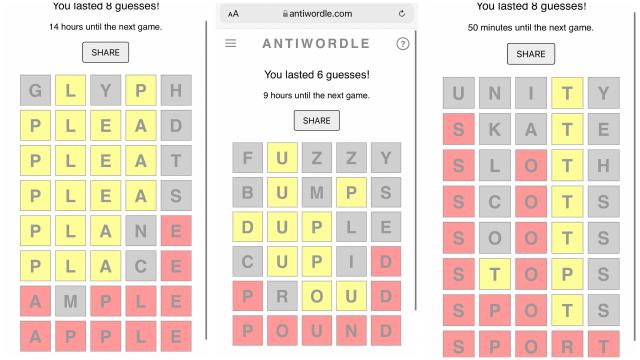Of all the Wordle variations, only a few have stuck with me. I play original Wordle the most regularly. Dordle and Quordle are a nice addition to the routine. When I’m bored, the larger multi-Wordles are fun, and it’s really satisfying to tussle with the AI that runs Absurdle and back it into a corner. But when I just want a quick little game that will have me swearing at my phone, there’s no better option than Antiwordle.
I recommend that you try Antiwordle immediately after losing a regular Wordle game. Here, losing is the whole point. You’re good at losing? Perfect.
Here’s how it works:
- Your goal is to avoid guessing the word for as long as possible.
- Red means the letter is in the right place (like a green in Wordle)
- Yellow means the letter is in there somewhere (same as in Wordle)
- Grey means the letter isn’t in there, and you’re not allowed to guess it anymore.
What makes Antiwordle so hard is that you must play words that match what you learned in your previous guesses. Reds have to be in the same place. Yellows have to be in there somewhere.
Yes, the red and yellow letter rules are the same as “hard mode” in regular Wordle (which you can access by clicking Wordle’s settings gear). The grey letter rules make Antiwordle a lot harder: Once you’ve guessed a grey letter, it’s completely out of play. And you’re still trying not to guess the word. It’s harder than it sounds, because you quickly run out of options.
How to win at Antiwordle
Antiwordle is strict about how you must play it, but vague about what it means to succeed. The goal isn’t to not guess the word, but to avoid guessing it for as long as possible. There is no moment where you know you have won, only a moment where you know you have lost. The closest thing you can find to happiness in this game is a loss with a large number of guesses behind you.
Since regular Wordle gives you six guesses, I think of an Antiwordle game as successful if it takes me more than six guesses to arrive at the answer. It’s still hard; I’m not sure if I’ve ever hit double digits or not. This morning, I guessed it in nine, and felt like that was pretty good. I was mad the whole time.
And that’s because anytime you get a red letter, you’re like fuck. And you never know when that letter is going to show up. You might be like “hahaha I’ll start with GLYPH” and get three reds. Good luck from there, bucko.
So, here is the closest I have come to a winning (losing) strategy:
- Only guess one vowel in your starter and the first few words. There are only so many vowels and you know at least one must be in there, so don’t spend them all at once.
- When you get a yellow, play it in the same place. You’ll know that word won’t be the solution.
- Double up red/yellow letters if you dare. If it turns out there’s only one of that letter, the second will appear in grey but they can’t stop you from guessing it again. The initial guess is risky, though.
- Don’t try to get smart and use all the rare letters at first. If you know the word has an E, that’s no biggie, lots of words have an E. If you know it has an X, well, your pool of possibilities just got a lot smaller.
I am torn on whether to try to guess the actual word while I’m playing. Normally I try to keep my mind off it, lest it get stuck in my head and then I can’t think of anything else. But knowing the actual word can also be an asset, so that I can make sure not to put 0 T in that final position, or whatever.
And with that, I’m out of helpful ideas. Just go give it a try, and see what happens. Good luck. You won’t win.

Leave a Reply